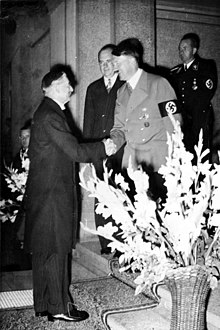Appeasement
diplomatic policy of making political or material concessions to an aggressive power in order to avoid conflict
Appeasement is a diplomatic policy of meeting political demands to a possibly-aggressive power to avoid conflict.[1]

The term was used especially for the foreign policy of the British governments of Prime Ministers Ramsay MacDonald, Stanley Baldwin and Neville Chamberlain towards Nazi Germany and Fascist Italy[2] between 1935 and 1939. It was supported by most people there and in France, most notably under Édouard Daladier, because people feared another world war.
Related pages
changeReferences
change- ↑ Appeasement – World War 2 on History Archived 4 April 2013 at the Wayback Machine
- ↑ Robert Mallett, "The Anglo‐Italian war trade negotiations, contraband control and the failure to appease Mussolini, 1939–40." Diplomacy and Statecraft 8.1 (1997): 137–67.